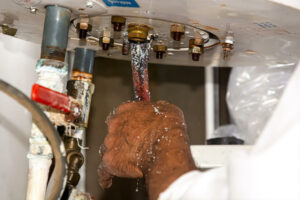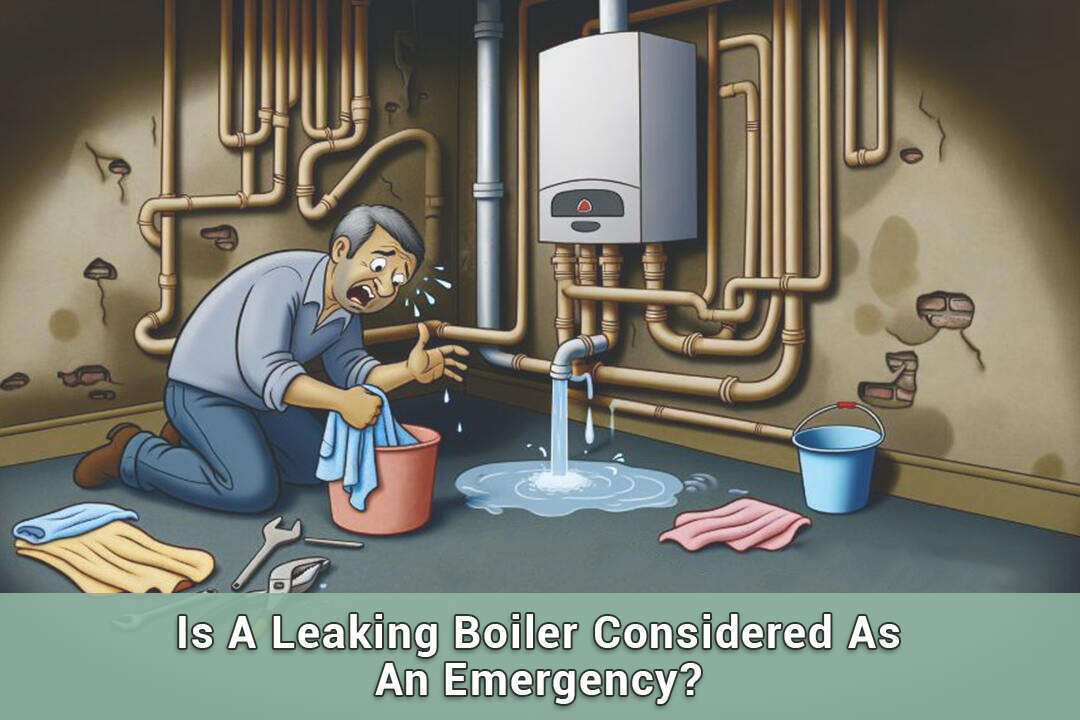Table of Contents
Leaky boilers may plague homeowners. They may damage the home and endanger individuals. This blog article will address boiler leak hazards, common water leak causes, and rapid treatments.
We’ll also investigate “is a leaking boiler an emergency?” Moreover, when to replace your boiler and the pros and cons of installing a new one versus fixing the old one. We will also talk about the different kinds of boiler leaks and how to avoid them.
Before diving into the boiler leaking syndrome, let’s understand the risk first. After all, we have to keep our home safe while making our living area cosy always.
Recognizing the Risk of Leaking Boiler
You must take a leaking boiler seriously. It may damage property and pose health and safety risks. Understand these risks to take the right action and address the situation swiftly.
The Risk to Health and Safety
Carbon monoxide, a colourless and odourless gas, could result if your boiler is leaking. It is not harmful to health in low quantities but could potentially be harmful in high-level. Its extreme level can result in sickness, dizziness, or even death in worse scenarios.
You should check your broken boiler right away and fix it. Find and spot the carbon monoxide leak and fix it at your earliest. Remember that carbon monoxide kills without being seen or heard. To protect your family, have a professional check your boiler often.
Potential Damage to Your Home
You and your home are both at risk of getting sick or hurt if your boiler leaks. Growing mould is worse for both health and the air quality. Long-term water leaks could be dangerous to your home’s structure, and the fixes will cost a lot of money.
Your whole heating system can be affected if you don’t fix a boiler that is dripping. This might cause heating and hot water issues, denying you essential comforts. Fixing the boiler leak quickly might save you money and prevent future damage.
Identifying Why Your Boiler Is Leaking
Fixing a leaking boiler requires finding the cause. Knowing the causes of boiler leaks will help you determine what to do.
Common Causes of Water Leaking Boiler
Common causes of boiler water leaks include:
- High boiler pressure: Tiny breaches in the boiler might leak water.
- Corroding boiler parts might cause water leaks.
- Bad installation: Untightened connections and seals might cause boiler leaks.
- Fixing boiler water leaks starts with identifying these common causes. By finding the leak and fixing it, you can keep your boiler running smoothly.
Signs of Corrosion and Poor Installation
Knowing how to recognise corrosion and incorrect installation is important because they cause boiler water leaks. Common symptoms of these issues are:
- Rust: The boiler or its components may show corrosion.
- Water damage or stains surrounding the boiler may indicate a poorly fitted leak.
- Your boiler may be malfunctioning if it bangs or hisses.
- Visual inspection: Examine the boiler system’s pipes, seals, and connections for corrosion or faulty installation.
- If you see any of these signs, contact a heating specialist immediately so they can assess the damage and provide solutions. Fixed quickly, these issues may prevent spillage and injury.
Quick Fixes for a Leaking Boiler

If your boiler leaks, try these simple fixes before hiring a specialist. These remedies may help temporarily resolve the issue and prevent further damage.
Adjusting the Pressure Relief Valve
High boiler pressure causes several boiler water leaks. Water may leak via microscopic fractures with high boiler pressure. Adjusting the pressure relief valve may help quickly.
The boiler’s pressure relief valve releases excess pressure for safety. Lowering the boiler’s internal pressure using the valve may stop the leak. Always note that altering the pressure relief valve is a temporary remedy and should only be done carefully. If valve adjustment is unpleasant, get professional help.
Dealing with Loose Joints and Damaged Seals
Boiler leaks can result from robust joints and worn seals. Deteriorating boiler rubber seals might cause leaks. Water may also escape boiler joints via microscopic fractures.
One simple fix is tightening loose joints and repairing damaged seals. Making sure all connections and seals are tight may stop the leak. The boiler contains hot water and potentially dangerous elements, therefore using it needs caution. If you’re unsure about these fixes, see a heating professional.
When Should One Consider Boiler Replacement?
Sometimes replacing the boiler is best, even if quick fixes may work. Your heating system’s lifespan, efficacy, and safety rely on when to replace your boiler.
Frequent Leaking Indicating a Bigger Problem
Frequent boiler leaks may indicate a more significant issue. Frequent leaks may signify urgent difficulties. It’s normally better to install a new boiler than to repair one, which may only give short-term relief depending on its age and condition.
Old Age and Wear of the Boiler
Older boilers leak more due to component wear and tear. Aged boiler seals, joints, and other parts may leak. If your boiler is old, replacing it with a new, more efficient one may save money and be safer. An expert heating technician can assess your boiler and provide a solution.
Professional Help vs DIY: Pros and Cons
You may be wondering whether to hire a professional or fix a leaking boiler yourself. Each strategy has pros and cons, so consider the problem’s complexity, your expertise, and potential risks.
When to Call a Professional
Leaky boilers may need professional repair. Some circumstances need expert help.
- Gas leaks: Call an expert gas engineer immediately if you suspect a gas leak. Gas leaks are dangerous, so engage an experienced specialist to secure your home.
- Complex repairs: If you can’t fix the leaky boiler, call a heating expert. They have the skills to diagnose and safely remedy the problem.
- Safety concerns: If repairs or alterations include risky parts, leave them to the pros. They know how to handle these situations well.
Simple Fixes You Can Do Yourself
Some boiler repairs are best left to specialists, but there are numerous simple fixes you may attempt first. Among them:
- Using the correct tools to tighten loose joints or connections may stop small water leaks.
- Small gaps in boiler seals or joints may be sealed with sealant or gasket material for a tight fit.
- Check the pressure gauge and the release valve. If the pressure gauge shows that the boiler is under too much pressure, make sure to fix the valve. Not sure if you can do the job safely? It’s best to ask a professional for help.
- You can try these simple fixes, but they won’t make the problem go away for good. If you’re still having problems or aren’t sure what caused the leak, it’s best to call a professional. As always, safety should come first. If you’re not sure what to do, call a licensed expert or heater specialist.
Preventive Measures to Avoid Future Boiler Leaks
While fixing a leaking boiler is crucial, preventing future leaks is just as vital. Precautions may prevent leaks and ensure your boiler’s safety and efficiency.
Importance of Regular Boiler Servicing
Maintenance and early detection of issues need frequent boiler servicing. An experienced heating professional will check the heat exchanger, temperature control, pressure relief valve and other boiler components during an annual boiler service.
Small leaks or defects may be repaired immediately to prevent additional damage or system failure. Consider buying boiler insurance packages, which generally include annual service, to ensure frequent maintenance and little downtime.
Incorporating a Magnetic Boiler Filter
Putting in a magnetic boiler filter could help cut down on leaks in your central heating system. A magnetic boiler filter keeps dirt and other things from getting into the lines and hurting the boiler. The filter makes the boiler last longer and work better by getting rid of trash and sludge. If you get enough boiler insurance, your money may be safe and the system will work if it needs to be fixed or replaced.
Understanding Different Types of Boiler Leaks
Knowing the types of boiler leaks will help you find the cause. Leaks in boilers might be gas or water. Additionally, oil leaks can also occur in boilers that use oil as a fuel source.
Water Leaks vs Gas Leaks
Water leaks from boilers may damage the boiler and its surroundings. These leaks are generally caused by corrosion, high pressure, or faulty installation. Gas leaks provide a greater danger and immediate safety hazard.
Natural gas has no aroma, therefore its smell may be used to detect a leak, but a distinctive smell helps. If you suspect a gas leak, call a licensed engineer or gas expert immediately to avoid explosions or CO poisoning.
The Consequences of Oil Leaks
Boilers that utilise heating oil may leak. The smell of oil suggests leakage, which might have serious consequences. First, oil leaks may increase fuel consumption and impair heating efficiency.
Second, oil odours may spread across the community, endangering public health. Finally, oil spills might damage the boiler’s oil tank or boiler, requiring replacement or repair. An oil leak must be addressed swiftly to prevent further damage and ensure heating system safety.
Choosing the Best Replacement for a Leaking Boiler
If your boiler leaks and repairs aren’t possible, consider replacing it. Selecting the best replacement boiler requires several factors.
Factors to Consider When Replacing a Leaking Boiler
The following should be considered while installing a new boiler:
- Type of boiler: Combi, system, and regular boilers are offered. Each kind has advantages and works with different heating systems.
- Efficiency: Choose a boiler with excellent energy efficiency to save energy expenditures and carbon emissions.
- Installation: Consider the boiler’s area and gas and water supplies.
- Budget: Consider installation costs and any additional features or components when setting a new boiler budget.
- Manufacturer reputation: Research several boiler manufacturers and select one with good customer reviews.
- You may pick the best replacement boiler for your needs by carefully assessing these aspects. A professional engineer can assist you choose the finest option for your home.
Is a Leaking Boiler an Emergency?
A leaking boiler requires immediate action, but is it an emergency? A leaking boiler may cause further damage and pose safety issues, therefore it should be treated as an emergency. Some things to do when a boiler leaks:
- Check the boiler’s pressure gauge before inspecting the relief valve. If pressure is too high, adjust the relief valve. If you are unsure how to accomplish this safely, consult a qualified engineer.
- To locate the leak, look for corrosion, water damage, or abnormal boiler system noises.
- Seeking professional help: If the leak persists, contact a safe engineer. They can assess the situation, identify the leak, and recommend a solution.
- Always prioritise family safety. Leave immediately and call the gas emergency hotline if you suspect a leak.
Conclusion
To conclude, a leaking boiler can endanger your health and home. The leak’s source must be found and fixed immediately. It’s important to know when to call a professional, even for simple tasks like tightening loose joints or adjusting the pressure relief valve.
Installation of a magnetic boiler filter and annual boiler maintenance may prevent further leaks. When upgrading a leaking boiler, consider size, cost, and efficiency. Remember that a leaky boiler should be fixed immediately.
Otherwise, you can replace your old boiler with a new one free of cost under the ECO4 scheme. All you need is to fulfil the eligibility criteria. Family and home safety should always come first.
FREE ELIGIBILITY CHECKER







